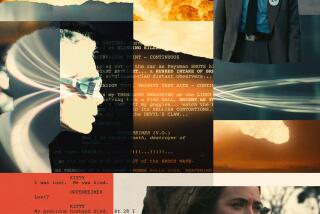‘Lone Survivor’ Marcus Luttrell’s devotion to duty
Marcus Luttrell is very polite and quiet — “Yessir,” “No, ma’am,” “Thank you very much” — but his abiding civil demeanor can’t mask the fact that the physically imposing former Navy SEAL isn’t inclined to suffer fools.
At a breakfast meeting at the Four Seasons hotel in Beverly Hills not that long ago, a waitress informed Luttrell that his companion dog, which Luttrell uses to help him deal with a traumatic brain injury suffered in combat, could no longer sit next to him on a banquette.
FOR THE RECORD:
Marcus Luttrell: An article in the Jan. 6 Calendar section about Navy SEAL Marcus Luttrell, on whom the movie “Lone Survivor” is based, said the film opened in New York and Los Angeles on Jan. 3. The movie opened in those cities on Dec. 25. —
“Who gave you that order, miss?” Luttrell said with a slight edge to his voice, gently patting his dog, Mr. Rigby. Told that it was local health code rather than instructions from some hardhearted hostess, Luttrell complied, albeit reluctantly. It was probably a good thing she didn’t notice that he was discreetly chewing tobacco.
VIDEO: Watch ‘Lone Survivor’ cast, crew discuss film
It’s impossible to understand fully what Luttrell experienced in the Afghanistan mountains in 2005, where he and three other SEALs were caught in a disastrous firefight against a much larger Taliban force that ultimately left 19 Americans dead. Luttrell wrote about the experience in his bestselling book, “Lone Survivor: The Eyewitness Account of Operation Redwing and the Lost Heroes of SEAL Team 10,” which has just been made into the movie “Lone Survivor” by writer-director Peter Berg.
It was more than a little hard for Luttrell to recount his ordeal in print. “I didn’t want to write the book. I’m a private person,” he said of his memoir, co-written by Patrick Robinson. He was compelled to pen it, he said, by his superiors.
“It was the Navy’s idea, not mine,” the 38-year-old Luttrell said. “They felt the story needed to be set straight.”
His commanding officers were equally assertive in recommending that he support a movie adaptation, which opened to solid reviews in New York and Los Angeles on Friday before expanding into national release Jan. 10.
“I didn’t want to do a movie,” Luttrell said. “But Hollywood was going to do it with or without us. That’s what came across the wire.”
Golden Globes 2014: Play-at-home ballot
So Luttrell personally auditioned Berg, the veteran of “Friday Night Lights” and “Battleship.” At the time, the book was being devoured throughout the movie world, and producers were beseeching Luttrell for a meeting. Berg was wrapping up his 2007 Middle East terrorism tale, “The Kingdom,” and invited Luttrell to take an early look.
Berg had prepared a detailed pitch for Luttrell, but soon after Luttrell watched Berg’s film he decided he liked the director’s attention to detail and was done looking for a show-business partner.
“It was the little things that most people would overlook,” Luttrell said of how Berg depicted the military in “The Kingdom.” “How people move tactically, how they handle their weapons, their communications — there was enough in there to show me he had the wherewithal to pull it off.”
The mission at the center of Luttrell’s story is both heart-stopping and heartbreaking.
Dropped by helicopter into Afghanistan’s Kunar province near the Pakistan border, Luttrell and three other SEALs — Matthew Axelson, Danny Dietz and leader Michael Murphy — were pursuing a Taliban leader when three goat herders, including a young boy, stumbled upon them. The film stars Mark Wahlberg as Luttrell, Taylor Kitsch as Murphy, Emile Hirsch as Dietz and Ben Foster as Axelson.
The four SEALs agonized over their options, knowing they couldn’t in good conscience kill the unarmed civilians, even as they were certain that if they released the trio they would alert the enemy, likely dooming Luttrell, Murphy, Axelson and Dietz. (If the SEALs tied up the three, they likely would have died from exposure or starvation.)
PHOTOS: Box office top 10 of 2013
Within minutes of freeing the goat herders, the SEALs were stormed by the Taliban. Axelson, Dietz and Murphy were shot multiple times and died on the battlefield, while a rescue helicopter carrying 16 Special Operations Forces was downed by a rocket-propelled grenade, killing all on board. Luttrell managed to escape the firefight seriously wounded (his injuries included a broken back and bullet wounds) but able to walk, and was taken in by a Pashtun villager, who sheltered Luttrell until American forces were able to rescue him.
Berg said he felt compelled to tell Luttrell’s story largely because the sacrifices and proficiency of U.S. armed forces are taken for granted. “If you were kidnapped overseas, these guys would do everything, and I mean dying if they have to, to get you out alive,” the filmmaker said.
“We just can’t really take a moment to think about it — we’re totally disengaged. But ‘Lone Survivor’ forced me to engage in the reality of these deaths, and to pay attention to how our men are dying. We need to support and understand what they are doing and what they are going through.”
That includes Berg’s not only collaborating with Luttrell in adapting his book, but also shepherding him through the publicity around the movie’s release. When a guest at one early screening of the film tactlessly asked Luttrell during a question-and-answer session what he thought of the “futility” of the war in Afghanistan, Berg nearly jumped out of his seat to make sure Luttrell kept his calm.
“Marcus is a tough guy,” Berg said. “But there’s a real sweetness to him. Once you get to know him, he’s one of the sweetest, most vulnerable guys I’ve met.”
PHOTOS: Billion-dollar movie club
While there were a few disagreements over Berg’s telling of the story — a knife fight in the film’s conclusion didn’t happen, for instance — Luttrell said he realized Berg “is the skipper of the whole thing” and that he was happy with how the adaptation turned out. “I didn’t want to make it into something it wasn’t,” Luttrell said. “The ultimate test is when a Navy SEAL walks out of the movie and says, ‘Good job.’ Then we did it right.”
Berg’s attention to detail include his studying the autopsy reports of the SEALs killed while fighting at Luttrell’s side, meaning that the R-rated film is as viscerally realistic as it is physiologically accurate.
Luttrell said every time he sees the film he averts his eyes at one scene only — the death of Axelson. “It’s the only part of the movie I don’t watch, because I wasn’t with him when he died in real life,” Luttrell said. “I don’t know how he died. But I know he died fighting.”
Luttrell said he isn’t haunted by the film any more than he is by the actual event.
“It goes through my head every day in life,” he said. “So when I watch it in the movie, I’ve already watched it in my head.”
PHOTOS: Greatest box office flops
When he’s not promoting the film, Luttrell is helping run the Lone Survivor Foundation, which helps treat wounded soldiers, including those suffering from post-traumatic stress disorder, and their families. Based on what facilitated Luttrell’s recovery from battlefield injuries, the Houston foundation emphasizes an outdoor, camp-like approach and interaction with horses.
He said he also is determined to open independent-living facilities for homeless veterans in major American cities. “There should be no way that veterans anywhere should be sleeping on the streets,” Luttrell said. “All I care about is putting a roof over their head and making sure there’s food in their stomachs.”
As breakfast wound down, Luttrell looked around the restaurant and scratched Mr. Rigby’s head.
“I knew I was born to do this at a very young age. And one of the beauties of SEAL training is that we don’t go back and wonder how we could have done things differently,” Luttrell said. “If someone were to come into this restaurant and open fire and kill us all, I would miss my wife and our kids. But I would have no regrets.”
More to Read
Only good movies
Get the Indie Focus newsletter, Mark Olsen's weekly guide to the world of cinema.
You may occasionally receive promotional content from the Los Angeles Times.











